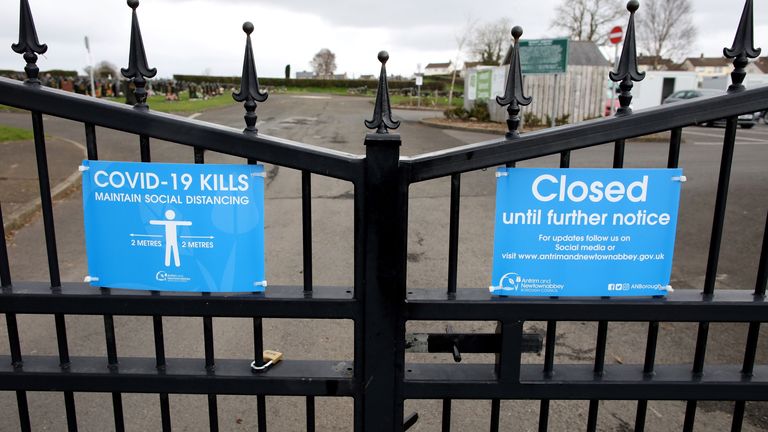A four-week “circuit breaker” lockdown will come into force in Northern Ireland on Friday in an attempt to stall the rise in coronavirus infections.
First Minister Arlene Foster confirmed the move in a statement and said that the half-term holiday break for schools will be extended and now last two weeks, from 19 to 30 October.
Pubs and restaurants will also have to shut, unless they offer a takeaway service, but places of worship and gyms can stay open.
It comes after a meeting of the Stormont executive that extended into the early hours of this morning.
The Derry and Strabane Council area, which has additional restrictions, has been experiencing the highest infection rate in the UK and Ireland, with a seven day average of 970 cases per 100,000 people.
The restrictions include:
- Household bubbles must be no bigger than 10 people from two households
- Overnight stays in other homes are banned
- Closure of “close contact services” (unless required for essential health reasons)
- Indoor sport of all kinds suspended, apart from at an elite level
- Mass events involving more than 15 people are to be banned
- Off licences and supermarkets will not be permitted to sell alcohol after 8pm
- Hospitality sector to close, apart from takeaway services
- No unnecessary travel should be undertaken
- Universities and further education providers should provide distance learning as much as, and where possible
- People are required to work from home where they can
- Gyms to remain open for individual training
- Places of worship to remain open, as long as face coverings are worn
- Wedding ceremonies and civil partnerships to be limited to 25 people with no receptions from 19 October
- Funerals and committals to be limited to 25 people with no pre or post-funeral gatherings
- Retail can remain open
The restrictions will initially last for four weeks, and any extensions will require a decision from the Northern Ireland Executive.
Ms Foster said of the fresh restrictions: “We fully appreciate that this will be difficult and worrying news for a lot of people.
“The Executive has taken this decision because it is necessary, and we discussed the impacts in great detail. We do not take this step lightly.
“We must reach a different place on both the numbers and on getting back to the basics of social distancing and I know everyone will want to work with us on that.
“Small acts can have large and important contributions to managing COVID-19.”
:: Subscribe to the Daily podcast on Apple Podcasts, Google Podcasts, Spotify, Spreaker
Welsh First Minister Mark Drakeford told Kay Burley on Sky News that he was considering a similar move, while Therese Coffey, the work and pensions secretary, played down the prospect of a similar move in England.
Labour leader Sir Keir Starmer has called on the government to impose a short lockdown, accusing it of losing control of the pandemic.
Analysis: ‘Stormont had no option’
By David Blevins, senior Ireland correspondent
It’s not a race Northern Ireland wanted to win – the first full region of the UK to impose a so-called circuit-breaker lockdown.
But with Derry and Strabane Council District still recording the highest infection rate in the UK, Stormont had no option.
The two largest parties in the devolved government – the DUP and Sinn Fein – struggled to agree on the closure of schools.
In the end, they compromised – extending the half-term holiday to two weeks rather the full four weeks of the latest lockdown.
It’s not a return to the stringent restrictions imposed in March – shops and places of worship will remain open with mitigations.
There is often division in the power-sharing coalition but they need to present a united front for these measures to be effective.

